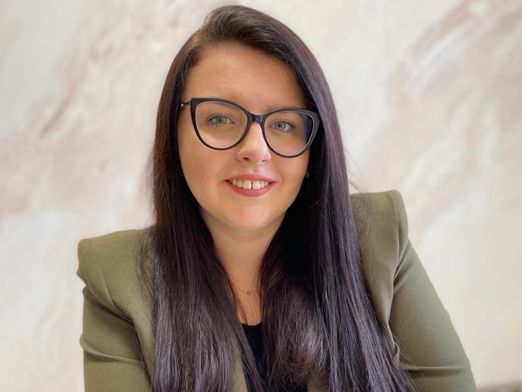Student, interrupted
Caitlin Crawshaw - 7 February 2023

When Russia invaded Ukraine in February 2022, Kateryna Shunevych’s focus shifted overnight from PhD work to survival.
“It was very stressful when the war started and you just didn’t know what the situation was or what would happen next,” she says. Not only did she fear for her safety, but the non-stop air raid sirens and ongoing threat of violence made it practically impossible to continue her studies.
Help came in the form of an invitation to continue her academic work at the University of Alberta through two different opportunities: an internship with the Canadian Institute of Ukrainian Studies (CIUS), through the Bohdan and Natalia Golemba Endowment Fund — initially offered in 2020 but postponed because of COVID — and a teaching opportunity via the Disrupted Ukrainian Scholars and Students initiative (DUSS UAlberta). DUSS UAlberta was created weeks after the attack by CIUS and its partners: the Kule Institute for Advanced Study (KIAS), Kule Folklore Centre, Department of Modern Languages and Cultural Studies, Department of History, Classics, and Religion and the Wirth Institute for Austrian and Central European Studies.
CIUS Director Dr. Natalia Khanenko-Friesen explains that since its inception last April, DUSS UAlberta has helped 47 scholars and students. Most have been able to travel to the U of A — but not all.
“Some had to stay in Ukraine and endure shelling while looking after their family members, for example, or for other reasons,” she says.
For scholars who cannot leave Ukraine, DUSS UAlberta has provided support from afar with grants, allowing them to work on research projects where they are.
Shunevych was one of the first Ukrainians accepted to the program, arriving on campus in April 2022 as a visiting fellow at the Canadian Institute of Ukrainian Studies. Initially, she’d been anxious to leave her husband and family behind, knowing she might not see them again.
“It’s like a horror movie,” she says.
Even so, Shunevych didn’t hesitate to accept the offer from CIUS and DUSS UAlberta, knowing it offered both safety and some degree of normalcy during an otherwise tumultuous time. It was also a unique opportunity for Shunevych to connect with international researchers and access an abundance of academic literature related to her doctoral work on the legislation of forensic evidence in criminal proceedings.
During her time at the U of A, Shunevych completed a chapter of her dissertation and managed to both write — and publish — several academic papers. She also taught a course on gender equality and human rights for the Department of Women’s and Gender Studies arranged by DUSS UAlberta.
The course was a perfect fit with Shunevych’s expertise as a lawyer and head of the think tank Analytical Сenter Jurfem, operated by the Ukrainian Women Lawyers’ Association (JURFEM). Before the Russian attack, she was working on legislative changes that would advance women’s rights in Ukraine, where domestic violence protection wasn’t legislated until 2018.
Although Shunevych couldn’t entirely escape the anxiety that comes with leaving family in a war zone, she found solace in new friends and connections.
“I met wonderful people in Canada,” she says. All of this offered much-needed solace: “I had a lot of time to be more easygoing and not think all the time about what was happening at home.”
Shunevych returned to Lviv before the winter break. She continues to develop her dissertation and work for JURFEM, but progress is impeded by spotty Internet connections and power outages, plus daily air raid sirens. Although she and her family live close to the Polish border, they’ve refused to leave their home.
“We just want it finished and for everyone to have the possibility of living in an independent Ukraine,” she says.
Unfortunately, the war rages on without an end in sight. Khanenko-Friesen says DUSS UAlberta will continue indefinitely, noting that the need is great and that she still receives queries almost every day from displaced scholars seeking academic placement:
“It pains my heart to see stellar experts, researchers and professors with well-entrenched careers and projects in their home regions being uprooted, displaced and on the run with their children and other dependents.”
If you'd like to support DUSS, please visit this link.